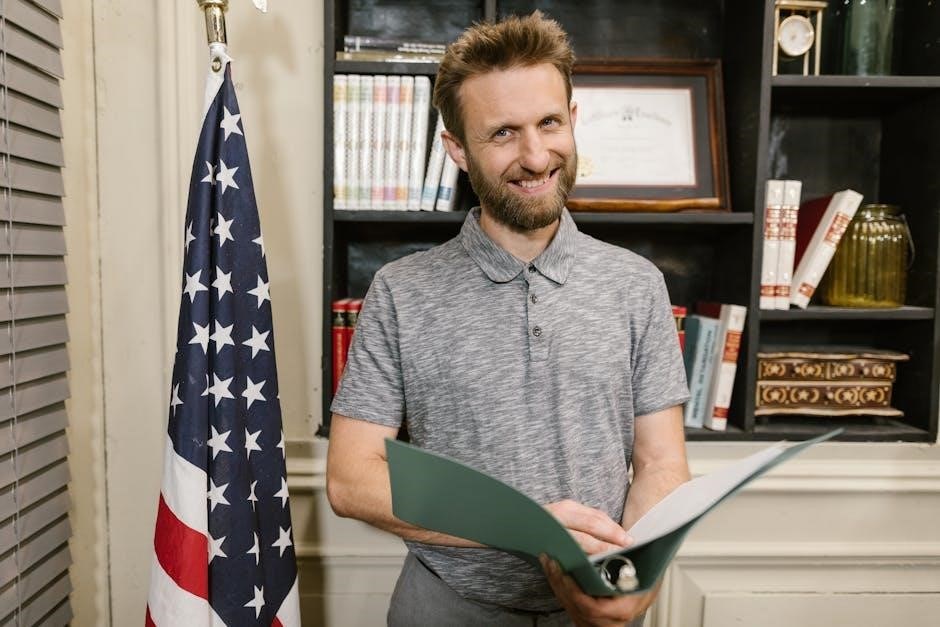A Medium of Instruction (MOI) certificate confirms the language used for teaching during a student’s academic journey. It is essential for universities and immigration processes, ensuring language proficiency compliance. This document validates the medium of education, often required for admissions in English-speaking countries, showcasing a student’s ability to study in a specific language effectively.
1.1 Definition and Purpose
A Medium of Instruction (MOI) certificate is an official document that verifies the language used for teaching and instruction during a student’s academic studies. Its primary purpose is to confirm that the student has completed their education in a specific language, typically English, which is crucial for universities, immigration authorities, and professional licensing bodies. This certificate serves as proof of language proficiency and educational compliance, ensuring students meet the requirements for further studies or career opportunities in English-speaking countries.

1.2 Importance in Educational and Immigration Contexts
The Medium of Instruction (MOI) certificate holds significant importance in both educational and immigration processes. It serves as proof of language proficiency, enabling universities to assess a student’s ability to engage with English-taught curricula. For immigration, it is often a prerequisite for visa applications, demonstrating compliance with language requirements. This document bridges educational and professional opportunities, ensuring students meet the linguistic standards for further studies or career advancement in English-speaking countries, making it a critical tool for global academic and professional mobility.

When is a Medium of Instruction Certificate Required?
A Medium of Instruction (MOI) certificate is typically required for university admissions, visa applications, and professional licensing. It verifies the language of instruction, facilitating educational and professional opportunities.
2.1 University Admissions in English-Speaking Countries
For students applying to universities in English-speaking countries, a Medium of Instruction (MOI) certificate is crucial. It verifies that their prior education was conducted in English, satisfying language proficiency requirements. This document is often mandatory for admission, especially for international students, to ensure they meet the linguistic standards for academic success. Universities use it to assess readiness for English-based curricula, making it a key component of the application process.
2.2 Visa and Immigration Applications
A Medium of Instruction (MOI) certificate is often required for visa and immigration applications, particularly when applying to English-speaking countries. It serves as proof that the applicant’s education was conducted in English, fulfilling language proficiency requirements. This document is crucial for skilled migrant visas or student visas, as it verifies English competence without additional testing. Authorities rely on it to assess eligibility, making it a vital component in the immigration process for candidates seeking to study, work, or settle abroad.
2.3 Professional Licensing and Certification
A Medium of Instruction (MOI) certificate is essential for professionals seeking licensure or certification in regulated fields. Licensing bodies often require it to verify that the applicant’s education was conducted in a specific language, ensuring compliance with language proficiency standards. This is particularly important for foreign-educated professionals in fields like healthcare, engineering, or law. The MOI certificate helps authorities assess qualifications without additional language testing, streamlining the licensure process for candidates aiming to practice their profession in English-speaking countries.
How to Obtain a Medium of Instruction Certificate
Contact your educational institution or the issuing authority to initiate the process. Submit required documents, such as academic transcripts or proof of enrollment, and pay the applicable fees. Processing times vary, so inquire in advance to ensure timely issuance for admissions or immigration purposes. Ensure all details are accurate to avoid delays.
3.1 Institutions That Issue the Certificate
The Medium of Instruction (MOI) certificate is typically issued by educational institutions where the applicant completed their studies. Universities, colleges, and schools are the primary issuers, as they maintain records of the language used for instruction. In some cases, language schools or educational authorities may also provide this certification. Applicants should directly contact their alma mater or relevant academic office to request the document. Ensuring the institution is recognized and accredited is crucial for the certificate’s acceptance by immigration or admission authorities.
3.2 Required Documentation for Application
To apply for a Medium of Instruction (MOI) certificate, specific documents are typically required. These include official academic transcripts, degree certificates, and proof of language proficiency. Some institutions may also request a formal letter specifying the purpose of the request. Additionally, identification documents such as a passport or student ID may be needed for verification. Ensuring all documents are up-to-date and authenticated is essential for a smooth application process. Submitting incomplete or inaccurate documentation can lead to delays or rejection of the request.
3.3 Processing Time and Fees
The processing time for a Medium of Instruction (MOI) certificate varies by institution, typically ranging from a few days to several weeks. Fees also differ depending on the issuing authority and country. Some institutions may charge a nominal fee for the certificate, while others offer it free of charge. Rush processing options may incur additional costs. It’s important to check with the issuing authority for exact timelines and fees to plan accordingly and avoid unnecessary delays in your application process.
Eligibility Criteria for the Certificate
To qualify for a Medium of Instruction (MOI) certificate, applicants must meet specific academic and language proficiency requirements. Eligibility varies by institution and purpose, ensuring compliance with educational or immigration standards.
4.1 Academic Qualifications
Academic qualifications are a critical factor in obtaining a Medium of Instruction (MOI) certificate. Applicants typically need to have completed their degree in the specified medium of instruction. Institutions often require proof of academic records, such as transcripts or diplomas, to verify the language of instruction. For instance, students applying for English-speaking universities must demonstrate that their prior education was conducted in English. This ensures the certificate aligns with the academic standards and language requirements of the destination country or institution.
4.2 Language Proficiency Requirements
Language proficiency is a key requirement for obtaining a Medium of Instruction (MOI) certificate. Applicants must demonstrate fluency in the specified medium, often through standardized tests like IELTS or TOEFL for English. These tests assess reading, writing, speaking, and listening skills. Institutions may also accept prior education in the medium as proof of proficiency. Exemptions may apply for candidates educated in English-speaking countries or those with documented evidence of language competence. This ensures the certificate reflects genuine language capability for academic or professional purposes.
4.4 Exceptions and Special Cases
Exceptions may apply for candidates educated in English-speaking countries or those with documented evidence of language competence. Heritage speakers or individuals with disabilities may qualify for special accommodations. Institutions may waive requirements for applicants with prior education in the medium or those who demonstrate proficiency through alternative assessments. Special cases often involve unique circumstances, such as bilingual education or international school programs, where the medium of instruction is clearly established. These exceptions ensure equitable access to the certificate for diverse applicants.

Legal and Compliance Aspects
The certificate must be notarized and apostilled for international recognition, ensuring compliance with legal standards. This process guarantees its authenticity and acceptance across different countries.
5.1 Notarization and Apostille Requirements
The Medium of Instruction Certificate often requires notarization and apostille for international recognition. Notarization involves a certified official verifying the document’s authenticity, while an apostille is an additional certification for countries part of the Hague Convention. This process ensures the certificate is legally recognized across borders. The apostille verifies the document’s legitimacy, making it acceptable for educational institutions and immigration authorities worldwide. Failure to obtain these certifications can result in rejection or delays in applications, emphasizing their critical importance in cross-border processes.
5.2 Acceptance Across Different Countries
The acceptance of the Medium of Instruction Certificate varies across countries, with specific requirements differing by region. For instance, countries like India, Canada, and the USA recognize the MOI for educational and immigration purposes, while others may require additional validations. Some nations demand the certificate to be apostilled or translated into their official language. Understanding regional requirements is crucial to ensure smooth processing of applications and avoid delays. Researching the specific guidelines of the destination country is essential for applicants seeking international opportunities.
5.3 Consequences of Non-Compliance
Non-compliance with the requirements for a Medium of Instruction Certificate can lead to significant consequences. These include delayed processing of university admissions, rejection of visa applications, and potential denial of professional licensing. Institutions may view incomplete or missing documentation as non-compliance, resulting in further administrative hurdles. In severe cases, it could jeopardize opportunities for international education or employment. Ensuring compliance with the specified requirements is crucial to avoid these challenges and facilitate a smooth process for applicants seeking opportunities abroad.

Common Challenges and Solutions
Challenges such as delays in issuance or rejection of applications can arise. Solutions include submitting documents early, ensuring accuracy, and addressing discrepancies promptly to avoid further complications.
6.1 Delays in Issuance

Delays in obtaining a Medium of Instruction certificate can occur due to incomplete applications or high volumes of requests. To avoid this, ensure all documents are submitted correctly and track the application status online. Follow-up with the issuing authority if delays persist, and consider submitting applications well in advance of deadlines to allow ample processing time. Planning ahead and verifying document accuracy can significantly reduce the likelihood of delays, ensuring timely issuance of the certificate.
6.2 Rejection of Applications
Applications for a Medium of Instruction (MOI) certificate may be rejected due to incomplete or incorrect documentation, such as missing academic records or language proficiency proof. Ensure all required documents are submitted accurately and meet the issuing authority’s guidelines. Double-checking the application for completeness and adhering to submission deadlines can help prevent rejection. Addressing discrepancies promptly and providing additional documentation when requested can resolve issues efficiently, ensuring a smoother application process and minimizing delays in obtaining the certificate.
6.3 Addressing Discrepancies in Documentation
Discrepancies in documentation for a Medium of Instruction (MOI) certificate often arise from incomplete or mismatched records. To resolve this, verify the accuracy of submitted documents and ensure they align with institutional requirements. If discrepancies are found, provide additional evidence or clarification promptly. Ensuring translations are certified and meet standards can prevent further issues. Addressing these matters swiftly helps maintain the integrity of the application process and avoids unnecessary delays in obtaining the certificate.